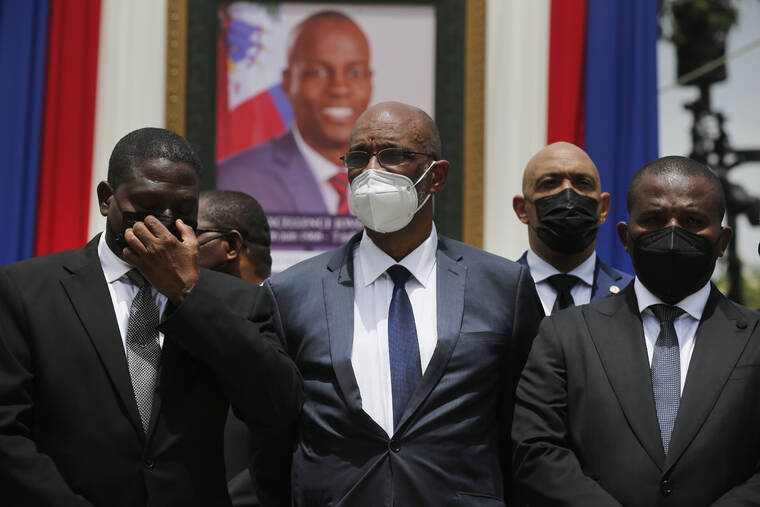PORT-AU-PRINCE, Haiti — A new chief prosecutor was sworn in Tuesday just hours after his predecessor asked a judge to charge Prime Minister Ariel Henry in the slaying of the president and to bar him from leaving Haiti, a move that could further destabilize a country roiled by turmoil following the assassination and a recent major earthquake.
The request filed by Port-au-Prince prosecutor Bed-Ford Claude, who was fired by Henry, came on the same day that the prosecutor had asked that the prime minister come to a meeting and explain why he spoke twice with a key suspect in the assassination of President Jovenel Moïse just hours after the killing.
“There are enough compromising elements … to prosecute Henry and ask for his outright indictment,” Claude wrote before he was replaced by Frantz Louis Juste, a prosecutor who oversaw the case involving the deaths of more than a dozen children in a fire at an orphanage near Port-au-Prince last year.
A spokesman for Henry could not be reached for comment.
It wasn’t clear if Claude’s removal would have any impact on the case, but an analyst noted that the investigation is in the hands of a judge.
It wasn’t clear if Claude was officially removed before he made the request to the judge. The Associated Press obtained a letter dated Monday in which Henry told Claude that he was being fired for an undefined “serious administrative fault” and that the decision was effective as soon as he received the document.
Claude did not respond to a request for comment on his firing or when he got the letter.
Claude said the phone calls in question were made at 4:03 a.m. and 4:20 a.m. on July 7, adding that evidence shows the suspect, Joseph Badio, was in the vicinity of Moïse’s home at that time. Badio once worked for Haiti’s Ministry of Justice and at the government’s anti-corruption unit until he was fired in May amid accusations of violating unspecified ethical rules.
In the two-page document, Claude said that the calls lasted a total of seven minutes and that Henry was at the Hotel Montana in Port-au-Prince at the time. The prosecutor also noted a government official tweeted last month that Henry told him he never spoke with Badio.
On Monday, Justice Minister Rockfeller Vincent ordered the chief of Haiti’s National Police to boost security for Claude because Claude had received “important and disturbing” threats in the past five days.
Brian Concannon, an adviser for the Institute for Justice and Democracy in Haiti, said he did not expect much to change despite the appointment of a new prosecutor.
“A lot of this is theater,” he said.
Concannon noted that the assassination case is in the hands of Judge Garry Orélien and that he can decide whether to pursue an investigation of Henry even if the new prosecutor advises otherwise. He said the judge has three months to determine whether to take action.
Robert Fatton, a Haitian politics expert at the University of Virginia, said there was clearly a power struggle within the government between Henry and those who supported Moïse.
“We have a very confusing situation, a power struggle at the moment, and we will see who will win it,” he said. “It’s not clear where we are going, and it’s not clear what the international community thinks about everything.”
In recent days, Haiti’s ombudsman-like Office of Citizen Protection announced it was demanding that Henry step down and asked that the international community stop supporting him.
Henry has not specifically addressed the issue in public, although during a meeting with politicians and civil society leaders on Saturday, he said he is committed to helping stabilize Haiti.
“Rest assured that no distraction, no summons or invitation, no maneuver, no threat, no rear-guard combat, no aggression will distract me from my mission,” Henry said. “The real culprits, the intellectual authors and coauthor and sponsor of the assassination of President Jovenel Moïse will be found and brought to justice and punished for their crimes.”
Moïse had appointed Henry as prime minister shortly before he was killed at his home in an attack that also seriously wounded his wife, Martine Moïse.
More than 40 suspects have been arrested in the case, including 18 former Colombian soldiers. Authorities are still looking for additional suspects, including Badio and a former Haitian senator.
The investigation is ongoing despite court clerks going into hiding after receiving death threats if they didn’t change certain names and statements in their reports.
In addition, a Haitian judge assigned to oversee the investigation stepped down last month citing personal reasons. He left after one of his assistants died in unclear circumstances. A new judge has been assigned.


